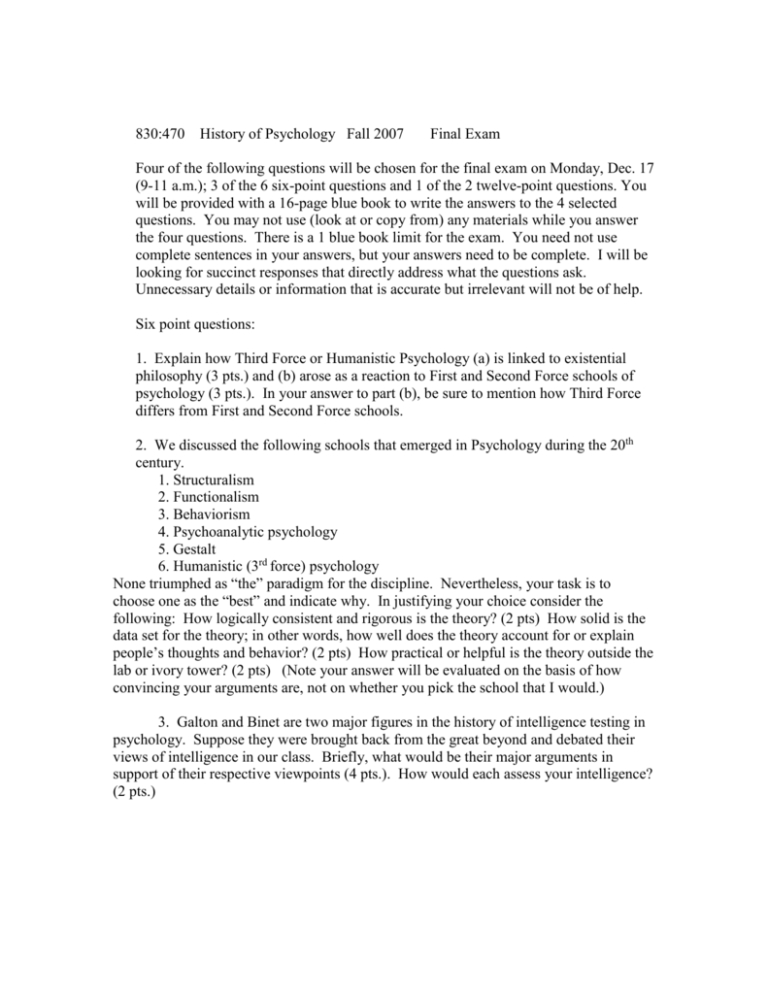830:470 History of Psychology Fall 2007 Final Exam
advertisement

830:470 History of Psychology Fall 2007 Final Exam Four of the following questions will be chosen for the final exam on Monday, Dec. 17 (9-11 a.m.); 3 of the 6 six-point questions and 1 of the 2 twelve-point questions. You will be provided with a 16-page blue book to write the answers to the 4 selected questions. You may not use (look at or copy from) any materials while you answer the four questions. There is a 1 blue book limit for the exam. You need not use complete sentences in your answers, but your answers need to be complete. I will be looking for succinct responses that directly address what the questions ask. Unnecessary details or information that is accurate but irrelevant will not be of help. Six point questions: 1. Explain how Third Force or Humanistic Psychology (a) is linked to existential philosophy (3 pts.) and (b) arose as a reaction to First and Second Force schools of psychology (3 pts.). In your answer to part (b), be sure to mention how Third Force differs from First and Second Force schools. 2. We discussed the following schools that emerged in Psychology during the 20th century. 1. Structuralism 2. Functionalism 3. Behaviorism 4. Psychoanalytic psychology 5. Gestalt 6. Humanistic (3rd force) psychology None triumphed as “the” paradigm for the discipline. Nevertheless, your task is to choose one as the “best” and indicate why. In justifying your choice consider the following: How logically consistent and rigorous is the theory? (2 pts) How solid is the data set for the theory; in other words, how well does the theory account for or explain people’s thoughts and behavior? (2 pts) How practical or helpful is the theory outside the lab or ivory tower? (2 pts) (Note your answer will be evaluated on the basis of how convincing your arguments are, not on whether you pick the school that I would.) 3. Galton and Binet are two major figures in the history of intelligence testing in psychology. Suppose they were brought back from the great beyond and debated their views of intelligence in our class. Briefly, what would be their major arguments in support of their respective viewpoints (4 pts.). How would each assess your intelligence? (2 pts.) 4. A college student believes that (s)he is depressed. Reported symptoms include lethargy (e.g., stays in bed most of the day, misses classes, doesn’t study), stagnation (e.g., believes that life is going no where, what’s the point of trying), and poor nutrition (e.g., eats little, mostly junk food). Given this information, offer a therapeutic plan from any TWO of the following: Behaviorism, Psychoanalysis, Humanistic psychology. For each approach, indicate (a) how you would determine the cause of the “depression” (2 pts.) and (b) offer two “help” suggestions (i.e., advice, therapy, plan of action) (4 pts). 5. Philosophers, psychologists, and pundits have frequently asked the question: what makes for a satisfying life? Is it moral behavior? Is it success in career? Is it success in procreation? Is it self-actualization? Is it obtaining maximum rewards? Is it the regard of others? ….. Let’s dig up a couple of dead founders and see what they might say. From the following list pick two and tell me how they would define a “satisfying” life (2 pts.) and how we mortals may achieve such a life (4 pts): Freud, Skinner, Kohler, Rogers. 6. Both psychoanalytic and behavioral theories generated offshoots that differed significantly in theory and practice from the founders. For psychoanalytic theory, neofreudians broke with Freud; for behaviorism, neobehaviorists broke with Watson. How was the psychoanalytic psychology of Jung different from Freud? (3 pts) How was the behaviorism of Tolman different from Watson? (3 pts) Twelve point questions: 1. State 3 important ways in which Behaviorism differs from Gestalt Psychology (3 pts.). State 3 important ways in which Gestalt Psychology differs from Psychoanalytic Psychology (3 pts.). State 3 important ways in which Behaviorism differs from Psychoanalytic Psychology (3 pts.). Which of the 3 schools is most closely aligned with Third Force Psychology? Justify your choice. (3 pt.). 2. Functionalism as a school of psychology had its roots in the U.S. Briefly describe 3 cultural sources of functionalism and note how each contributed to the functional perspective in American psychology (3 pts). James and Freud were contemporaries, and each “fathered” a different view of psychology. Cite 2 points of agreement and 3 points of disagreement between James and Freud. (5 pts). Which (Functionalism or Psychoanalytic psychology) had the more lasting impact on (a) the discipline of psychology and (b) our culture? Justify your answer (4 pts).




